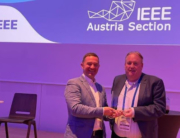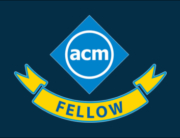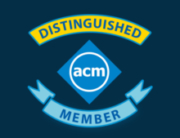Global ICT Professional Body Recognises Contributions of 18 High Achieving Members
In an historic move, IFIP has announced its first cohort of Fellows, elevating 18 Members to the new higher status in recognition of their substantial and enduring contributions to the ICT industry.
IFIP President, Professor Mike Hinchey, said he was delighted to welcome so many members to the new grade of Fellow and congratulated them on their achievements.
“Many of our members play very significant roles in driving innovation, conducting research and industry development,” he said.
“These are committed professionals who have helped to shape the ICT sector in a significant way, both through the roles they have played in IFIP Technical Committees (TCs) and Working Groups (WGs), and through their contributions to their various professional domains. IFIP is proud to reward their efforts with recognition as Fellows,” he said, noting that the Federation is already accepting nominations for future Fellows.
The new Fellows are:
- Erol Gelenbe (UK)
- Sir Charles Antony (Tony) Richard Hoare (UK)
- Lothar Thiele (Switzerland)
- Grzegorz Rozenberg (Netherlands)
- Joelle Coutaz (France)
- Bertrand Meyer (France)
- Wil van der Aalst (Netherlands)
- Fabio Paterno (Italy)
- John Mylopoulos (Canada)
- Gene Tsudik (USA)
- Roman Slowinski (Poland)
- Leslie G. Valiant (British)
- Jan Gulliksen (Sweden)
- Frank Tip (USA)
- Gerhard Goos (Germany)
- Andreas Zeller (Germany)
- Michael Franz (USA)
- Julio Abascal (Spain)
Erol Gelenbe was recognised for his pioneering work on Computer and Network Performance. A pre-eminent academic based at London’s Imperial College, Gelenbe was responsible for introducing the G-Networks Model and Random Neural Networks as well as contributing to products including QNAP (Sydney Performance Analysis software), the FLEXSIM manufacturing system simulation tool, the SYCOMORE (Thales) Voice Packet Switch, and the C2Agents (QinetiQ) Command and Control Decision Aid. His research into energy-efficient cloud computing and networks of queues has been heavily cited and he has been a member of both IFIP WG 6.5 (Computer-based Message Services) and WG 7.3 (Computer Systems Modelling). A Member of Academia Europaea, he is a Fellow of IEEE and ACM and has graduated 77 PhDs, including 17 women.
Sir Tony Hoare is a British computer scientist known for developing Hoare logic for verifying program correctness, and the formal language communicating sequential processes (CSP) to specify the interactions of concurrent processes (including the dining philosophers problem) and the inspiration for the programming language occam. Emeritus Professor of Oxford University’s Department of Computer Science, he won the prestigious ACM Turing Award in 1980 and was knighted for services to education and computer science in 2000. His seminal paper, Communicating Sequential Processes (CACM, 1978) has over 18 000 citations. Hoare is a distinguished Fellow of IFIP TC 1 (Foundations of Computer Science) and also served on IFIP WG 1.9/2.15 (Verified Software), WG 2.1 (Algorithmic Languages and Calculi), WG 2.2 (Formal Description of Programming Concepts) and WG 2.3 (Programming Methodology).
Lothar Thiele was awarded a Fellowship for his outstanding contributions in the area of multiobjective optimisation. Based at ETH Zurich, Computer Engineering and Networks Laboratory, he is responsible for inventing, together with E. Zitzler, the very popular Strength Pareto Evolutionary Algorithms SPEA and SPEA2 and also proposed a systematic approach to designing test problems for evaluation of multiobjective evolutionary algorithms. Widely cited for his work on multiobjective algorithms and multiobjective optimization, Thiele served as a member of IFIP WG 10.2 (Embedded Systems).
Grzegorz Rozenberg has enjoyed a lengthy career in which he made distinguished contributions to various areas relating to the foundations of computer science, including formal languages (the theory of L systems introduced together with Arto Salomaa), and DNA computing. A long-time member of IFIP TC 1 (Foundations of Computer Science), Rozenberg holds honorary doctorates from several leading universities, was President of the European Association for Theoretical Computer Science from 1985-1994 and is a member of Academia Europaea.
Joelle Coutaz is an internationally acclaimed researcher with significant achievements in the software aspects of HCI, including multimodal interaction, software architecture modelling and plasticity of user interfaces. Based at the Laboratory of Informatics at the university of Grenoble Alps in France, Coutaz has been investigating the concept of plasticity of user interfaces, user interfaces for mobile computing, the notion of context of use, as well as the design and implementation of artefacts that blend the physical and the virtual. She is also investigating the problem of end-user software engineering for smart homes within the general framework of ubiquitous computing. A long-time member of IFIP WG 2.7 (User Interface Engineering) from 1988 to last year, acting as its Vice Chair from 1995-1999. She also served on the program committees of IFIP conferences in 1992, 1993, 1997 and 2005. She was awarded an IFIP “TC13 Pioneer award” for “outstanding contributions to the educational, theoretical, technical, commercial or professional aspects of analysis, design, construction, evaluation and use of interactive systems” in 2013.
Bertrand Meyer is a French academic and scientist responsible for the Eiffel programming language and the concept of design-by-contract. Professor of Software Engineering at ETH Zurich from 2001-2016, he is currently a Professor at the Polytechnic University of Milan. His book, “Object-Oriented Software Construction” is one of the earliest and most comprehensive works presenting the case for object-oriented programming. A recipient of the IFIP Silver Core Award, Meyer is a Past Chair of IFIP TC 2 (Software Theory and Practice) and a member of WG 2.3 (Programming Methodology).
Wil van der Aalst was recognised for his impressive foundational contributions to Business Process Management by developing workflow management patterns and the YAWL language for workflow management. A member of both IFIP WG 8.1 (Design and Evaluation of Information Systems) and WG 2.12 (Web Data Semantics), van der Aalst presented a Keynote address at the IFIP World Computer Congress 2018 in Poznan, Poland.
Fabio Paterno is Fabio Paternò is Research Director and Head of the Laboratory on Human Interfaces in Information Systems at the Institute of Science and Technology (ISTI-CNR) in Pisa, Italy. He was recognised for his numerous contributions to Human Computer Interaction (HCI) and also to connected fields such as Software Engineering and Artificial Intelligence. He has published over 250 papers in refereed international conferences or journals and his book, “Model-based Design and Evaluation of Interactive Applications” had a huge impact on the HCI community. Italy’s National Representative to IFIP TC 13 (Human Computer interaction) since 1996, Paterno also chaired IIFIP WG 2.7/13/4 (User Interface Engineering) and is a member of IFIP WG 13.2 and 13.3. He was awarded an IFIP Silver Core in 2013.
John Mylopoulos is a scientist who has made an outstanding contribution to Software Engineering, collaborating on the Telos approach to representing knowledge about information systems, and helping to develop TROPOS, an agent-oriented software development methodology. Born in Greece, he now resides in Canada and works at the University of Toronto. He has been a member of WIFIP WG 2.9 (Software Requirements Engineering), 2.12 and 5.12 (Architectures for Enterprise Integration).
Gene Tsudik was named a Fellow for his significant contributions to cybersecurity and privacy, particularly through the development of the highly efficient provably secure PDP technique (Provable Data Possession) based entirely on symmetric key cryptography, as well as his group signature and companion identity escrow scheme. Based at the Department of Computer Science, University of California, Tsudik is a member of IFIP WG 11.3 (Data and Application Security and Privacy). He is an IEEE Fellow and ACM Fellow.
Roman Slowinski is a scientist known for his work in the areas of dominance-based rough set theory and robust ordinal regression. Professor and Founding Chair of the Laboratory of Intelligent Decision Support Systems at the Institute of Computing Science, Poznań University of Technology, Poland, Slowinski has been developing methodology and techniques of decision support, including multiple criteria decision aiding, multiobjective optimization, preference modelling and knowledge-based decision support. His research results have been applied to decision support in medicine, technology, economics and environmental studies He was General co-Chair of the IFIP World Computer Congress 2019 in Poland and is a member of IFIP TC 12 (Artificial Intelligence)
Leslie G. Valiant is a British computer scientist and computational theorist who is currently the T. Jefferson Coolidge Professor of Computer Science and Applied Mathematics at Harvard University. Known for introducing the concept of the learning machine (theoretical foundation of programming by example) and bulk-synchronous parallel (BSP) model, he is a Distinguished Fellow of IFIP TC 1 (Foundations of Computer Science) and a former winner of the prestigious ACM Turing Award.
Jan Gulliksen is a pioneer researcher and educator focusing on HCI research for societal impact through user-centred design, usability and accessibility for all. Professor of HCI and dean of the School of
CVomptuer Science and Communication at the KTH Royal Institute of Technology in Stockholm, Gulliksen was appointed “Sweden’s Digital Champion” by the Swedish Government in 2012, and is also Chairman of the Government’s Digital Commission. He won the IFIP Silver Core Award in 2007 and became an IFIP TC13 Pioneer in 2016 in recognition of his active participation in IFIP Technical Committees and related IFIP groups, and outstanding contributions to the educational, theoretical, technical, commercial or professional aspects of analysis, design, construction, evaluation and use of interactive systems.
Frank Tip is a leading researcher working at the boundary of Programming Languages and Software Engineering, focusing on tools for improving software quality and programmer productivity. He is the inventor of automated program refactoring techniques that are used in many integrated development environments, most notably the Eclipse framework. His work includes program slicing, refactoring, and change impact analysis. Professor and Associate Dean for Graduate Programs at the College of Computer and Information Science at Northeastern University in Boston, Tip chaired IFIP WG 2.4 (Software Implementation Technology) from 2011-2018 as well as serving on numerous professional committees and expert groups.
Gerhard Goos was honoured for his outstanding contributions as an educator in the field of Information Processing. The first Chair of Informatics at the University of Karlsruhe, Goos was a founder of the Foschungszentrum Informatik in 1983, and led its Software Engineering group. Many of Prof. Goos’ doctoral students from that group have gone on to top academic posts in Germany, Sweden and the UK. In 1987-88 he helped found the International Computer Science Institute, a joint effort by the Gesellschaft für Mathematik und Datenverarbeitung and the University of California at Berkeley. A founding member of IFIP WG 2.4 ( Software Implementation Technology) in 1974, he chaired that group from 1981-85.
Andreas Zeller is best known for his contributions to software engineering, particularly in relation to automated debugging and mining software archives. He introduced the idea of delta debugging on inputs, which one of the most prominent and most widely used techniques for automated debugging, and he pioneered the research area known as software repository mining. His publications on debugging, fault localisation and defect prediction are highly influential. An ACM Fellow and member of IFIP WG 2.4 (Software Implementation Technology), Zeller has received several prestigious awards and has chaired and organised numerous conferences and seminars. His research has provided the foundation for the start-up Testfabrik AG that develops techniques for automatic testing of Web applications.
Michael Franz has made breakthrough contributions through his invention of trace-tree dynamic compilation, (particularly suited for dynamic languages like JavaScript), and his technological leadership in bringing this technology to the open-source Firefox browser. He convinced Mozilla to incorporate his trace-tree compilation technology into Firefox, accelerating JavaScript performance by a factor of 7x and positively impacting literally hundreds of millions of users worldwide. Franz was the Swiss Country representation to IFIP TC 2 (Software Theory and Practice) from 1994-96 and has held membership of WG 2.4 (Software Implementation Technology) since 1998. He has also served on WG 11.3 (Data and Application Security and Privacy) from 2008-17 and WG 11.10 (Critical Infrastructure Protection) since 2018.
Julio Abascal has been recognised as an IFIP Fellow for his work as a teaching and research pioneer in the HCI field in Spain and across Europe. He contributed to the creation of a Spanish speaking HCI community (AIPO) collaborating with other universities in numerous research and teaching activities. His research in HCI and disability contributed to the international advancement of the field of universal accessibility. In this area, he has collaborated with researchers and institutions worldwide in research, teaching and promoting accessibility. In 1985 he founded (and has since headed) one of the first research teams in HCI and disability, and has served as an expert, reviewer and evaluator for most EU research programs on accessibility. Abascal has represented Spain in the IFIP TC13 (HCI) since 1991, co-founding WG13.3 (HCI and Disability) in 1993 and chairing it until 1998. Her has also been a member of WG 13.1 (Education in HCI and HCI Curriculum) since 1993, co-organising numerous HCI conferences for IFIP.





